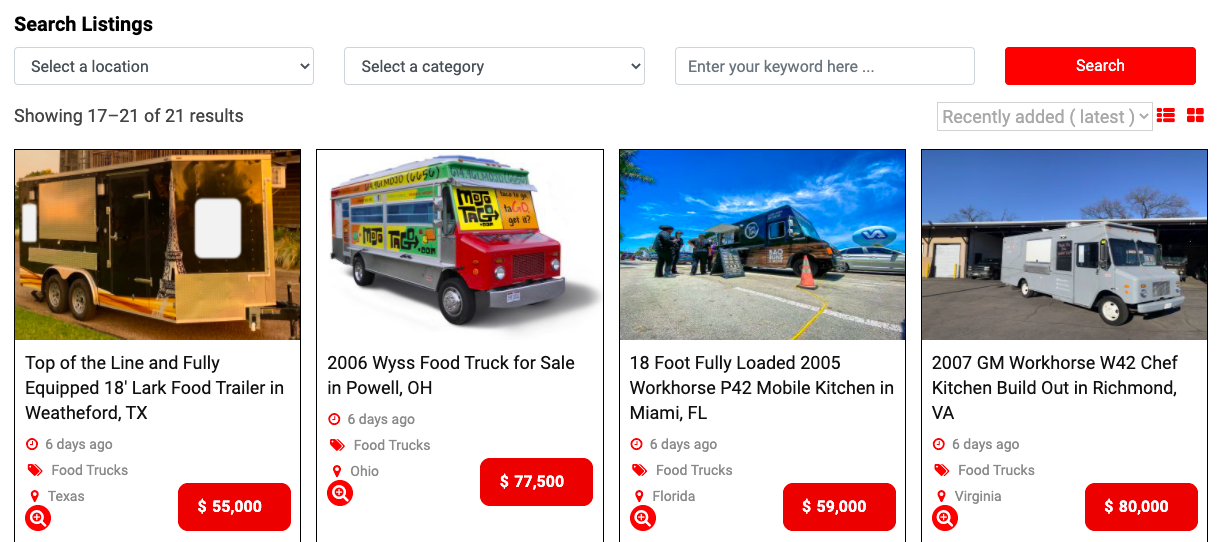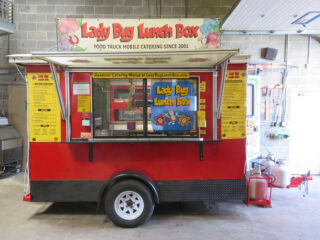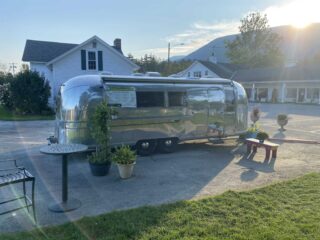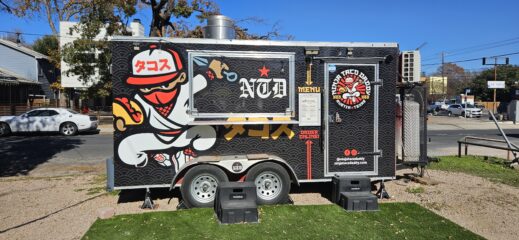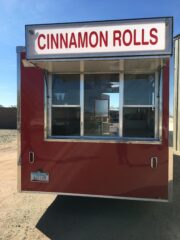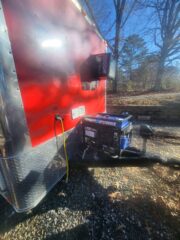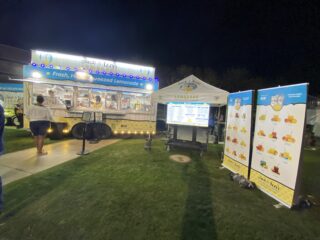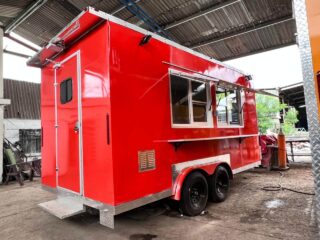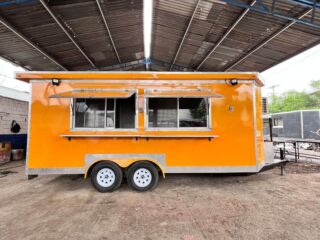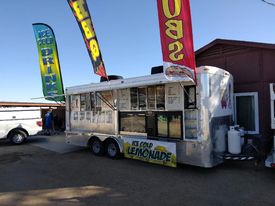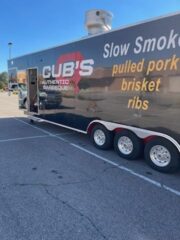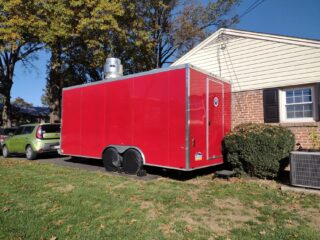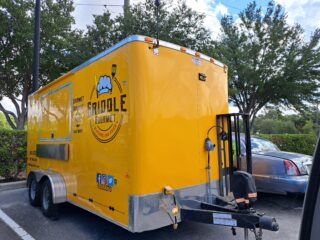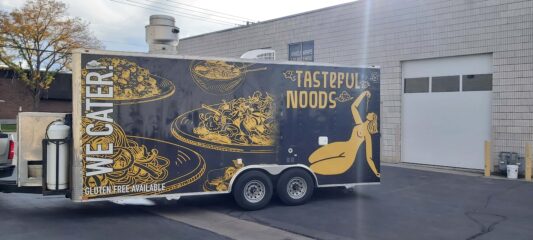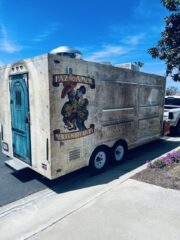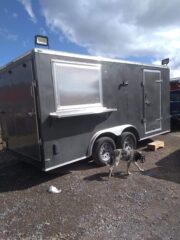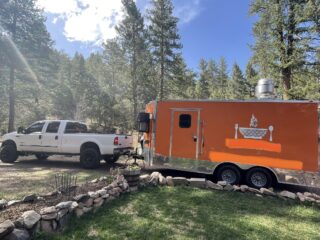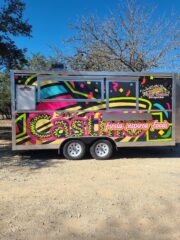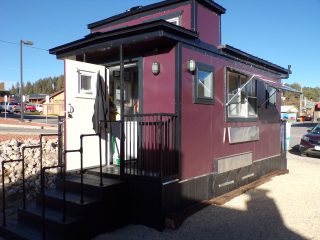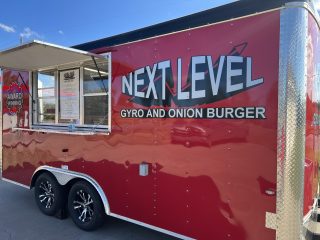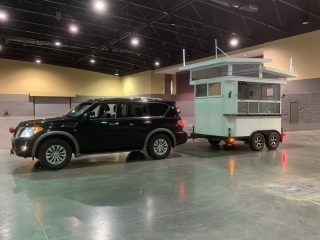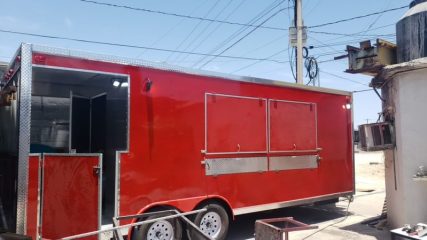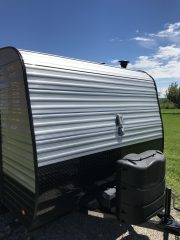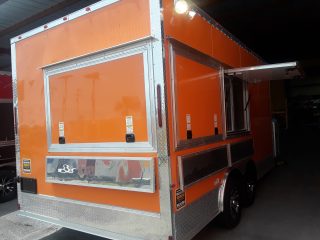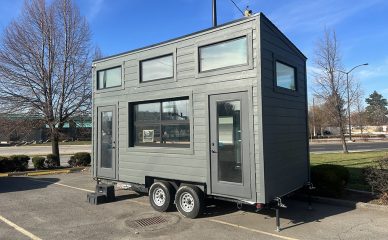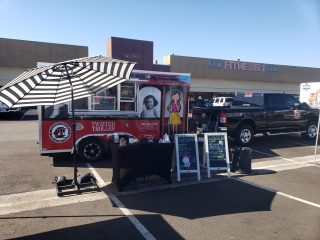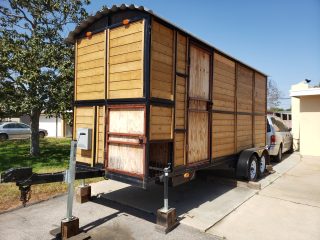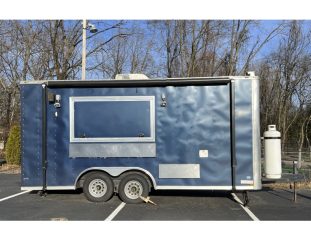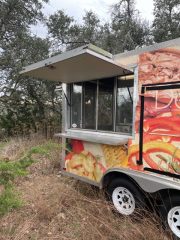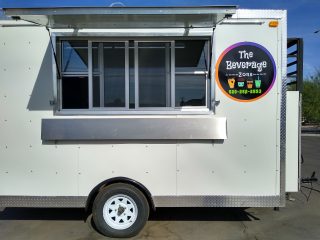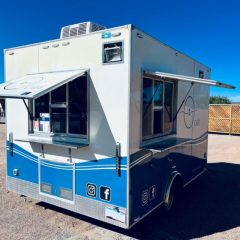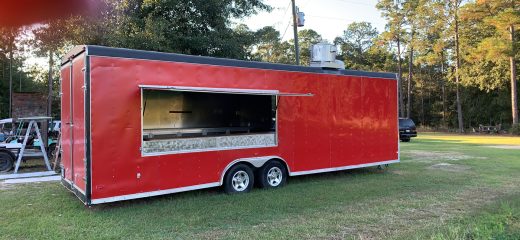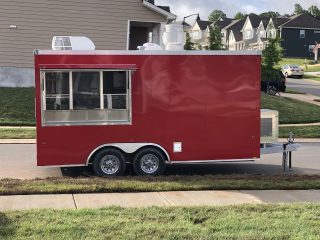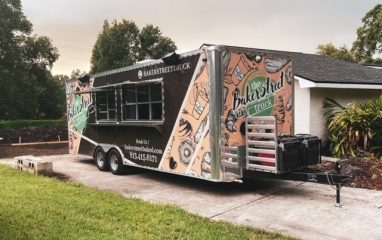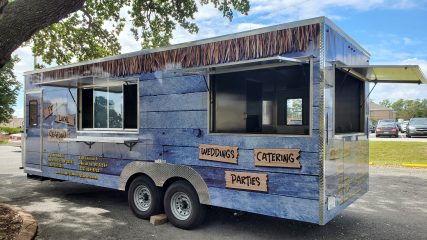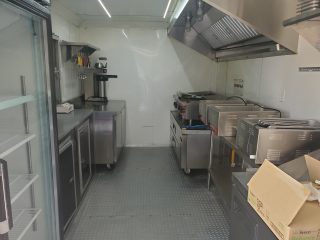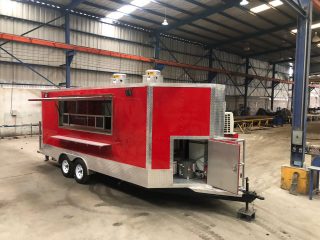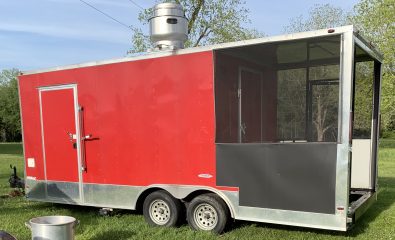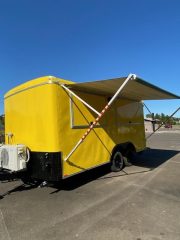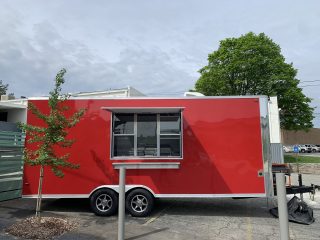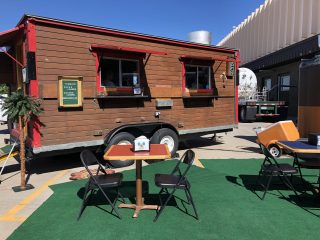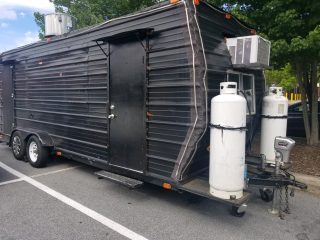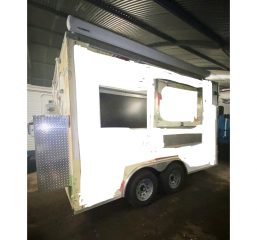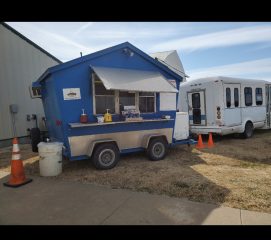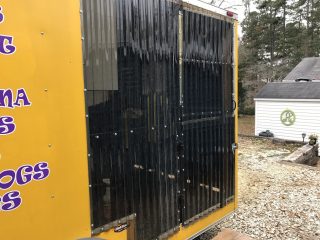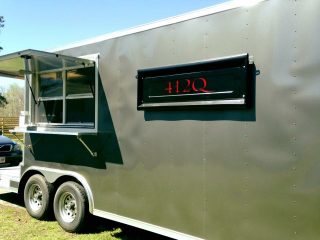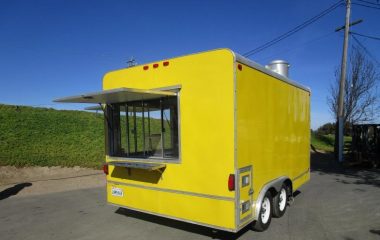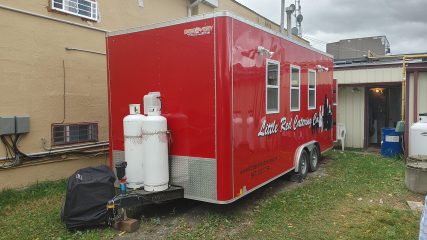Navigate to the bottom of this page or click here to browse active concession trailer listings.
If you’re ready to jump into the food industry full-time, you’ve probably at least considered the possibility of gaining a foothold in the marketplace by launching your business in a food truck or concession trailer. Compared to financing and launching a brick-and-mortar business, food trucks and trailers have relatively low overhead, everything within reach in a small kitchen that you can manage with little staff, and the flexibility to change either your location or your concept as needed, if (when!) things don’t all go according to plan.
Compared to full-fledged food trucks (which can easily cost upwards of $100,000, when fully tricked out to your specifications), concession trailers are relatively inexpensive (starting at just a few thousand dollars, without equipment), and can be used in either a mobile or semi-permanent capacity.
Active Used And New Concession Trailers For Sale by Owner
- Successful Turnkey Food Truck and Mobile Catering Business for Sale in Syracuse, NY (Asking: $75,000)
- Classic 1968 Airstream with Ford F350 for Towing for Sale in Vermont (Asking: $75,000)
- Excellent Condition 8.5′ x 14′ Loaded Food Trailer for Sale in Austin, TX (Asking: $29,000)
- Good Condition Bakery Trailer for Sale in Yuma, AZ (Asking: $40,000)
- Turnkey 5-Star Food Trailer Business for Sale in Granite Falls, NC (Asking: $70,000)
- Beautiful 18 Foot Custom Lemonade, Food, and Desert Trailer for Sale in Phoenix, AZ (Asking: $110,000 OBO)
- 20′ x 8′ Pace Food Concession Trailer for Sale in Phoenix, AZ (Asking: $65,000)
- Red Skinned 18′ x 8′ Mobile Kitchen for Sale in Mount Joy, PA (Asking: $54,500)
- Custom-Built Smoker Trailer for Sale in Denver, CO (Asking: $82,000)
- Well-Equipped 2020 – 7′ x 16′ Cargo Craft Food Trailer with Title in Spring Hill, FL (Asking: $36,000)
- 20′ Mobile Vending Food Concession Trailer with Wok Range in Salt Lake City, UT (Asking: $60,000)
- Brand New Fully Loaded 2022 Custom Food Trailer in Oceanside, CA (Asking: $100,000)
- 10′ x 10′ Custom-Built Margarita Trailer for Sale in Meridian, ID (Asking: $49,000)
- 2019 Lark 8’ x 16’ Food Concession Trailer for Sale in Clifton, CO (Asking: $34,998)
- Asian Food Concession Trailer for Sale in Littleton, CO (Asking: $60,000)
- Pre-Owned 2022 Cargo Craft Food Concession Trailer in Mustang, OK (Asking: $53,000)
- 2020 Iron Eagle Mobile Kitchen for Sale in Mayhill, NM (Asking: $60,000 OBO)
- 2018 Custom-Made Shaved Ice Mobile Café for Sale in Kimberling City, MO (Asking: $39,500)
- 26ft Money Making Custom-Built Trailer Now Listed in Mesa, AZ (Asking: $64,000 OBO)
- 2022 Nationcraft 6’ x 12’ Custom-Built Food Trailer in Mount Ulla, NC (Asking: $19,000)
- Never Used 2022 Food Trailer for Sale in North Carolina (Asking: $50,000)
- Airstream-Style Trailer Fully Outfitted and Service Ready in Attleboro Falls, MA (Asking: $65,000 OBO)
- 16′ x 8′ Food Concession Trailer for Sale in Long Beach, CA (Asking: $45,000)
- One-Of-A-Kind Custom 18ft Food Concession Trailer in Chula Vista, CA (Asking: $35,000 OBO)
- Brand New 2021 FUD Trailer for Sale in Maricopa, AZ (Asking: $30,000)
- Complete Pro Mobile Food Concession Trailer in Ambrose, GA (Asking: $52,500 OBO)
- Outstanding 2020 Custom Built 24ft Food Trailer for Sale in Morehead City, NC (Asking: $75,000 OBO)
- Luxurious Food Concession Trailer in Iron River, MI (Asking: $39,000)
- Turnkey Hot Beverage and Food Concession Trailer in North Carolina (Asking: $25,000)
- Custom Catering Food Trailer for Sale in Florida (Asking: $31,900)
- Brand New Fully-Loaded 20 Foot Trailer in Atlanta, GA (Asking: $64,000)
- Gooseneck Food Concession Trailer for Sale in Colorado City, AZ (Asking: $50,000)
- Top of the Line and Fully Equipped 18′ Lark Food Trailer in Weatherford, TX (Asking: $55,000)
- Custom 2019 Food Concession Trailer for Sale in Altamonte Springs, FL (Asking: $55,000)
- 24′ Fully Equipped Custom Food Concession Trailer in Swannanoa, NC (Asking: $30,000)
- 20′ Homemade Food Concession Trailer in Aurora, CO (Asking: $24,000)
Most of the topics we’ll cover here pertain specifically to concession trailers (which we’ll define as any food preparation unit that doesn’t operate under its own power, and must be towed behind a vehicle), and more specifically to buying a used unit.* Let’s get started, shall we?
*If you’re the kind of magnificent high-roller that is building a brand new concession trailer from the ground up on an unlimited budget, our advice for now is just: “Do whatever you want.” Leave us budget-conscious people over here in the corner, talking amongst ourselves and eating discounted tuna fish out of a can.
View Our Used Concession Trailer Listings Here
Figure out how much concession trailer you need. The first step when shopping for a used concession trailer, is to figure out exactly what your needs are. Will your trailer remain mostly fixed in one spot, or will it be mobile? Will you need to have staff helping you, or will this be a single-person operation?
Will you be catering events where water and electricity are supplied, or will you need to be able to operate under your own steam? Many people tend to focus on smaller trailers, because they are less expensive and seem like they’d be easier to move around, but here’s a simple truth: Towing a concession trailer is an enormous pain in the ass.* Powering down all of your equipment, draining the fryers, packing up your signage, and locking down all loose items in preparation for moving is just as much of a hassle when your trailer is 8×20, as it is when your trailer is 8×10.
*I’m terrible at towing, which is why my own concession trailer tends to stay in one spot. Even though I understand the mechanics of backing up with a trailer, and my brain knows what my hands are supposed to be doing, my trailer consistently ends up jackknifed next to me, staring at me through my driver’s-side window.
A smaller trailer may seem more manageable and easier to move, but make sure that in your quest for increased mobility, you don’t compromise how productive you can be in your mobile kitchen. Smaller concession trailers mean less equipment, which will place an arbitrary cap on how much food you can store and produce, how much propane you can carry, and what quantities of disposables you can buy (buying 1000 paper cups is exponentially less expensive than buying 100, but where are you going to keep them?).
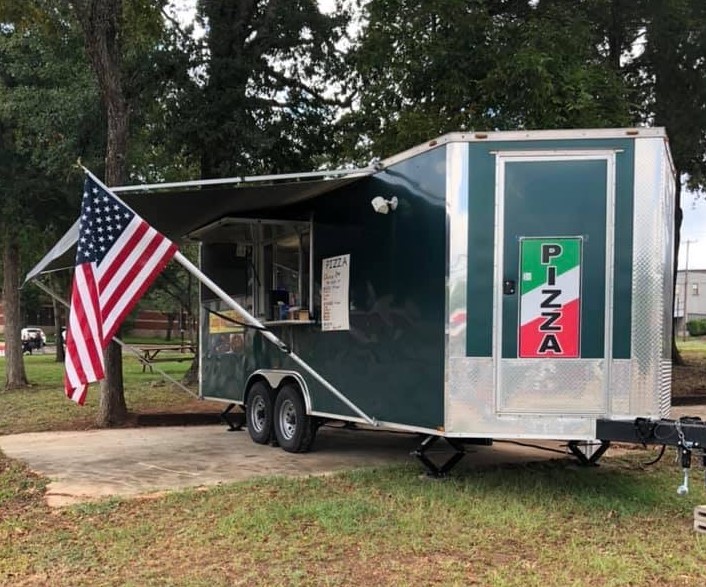
Used pizza concession trailer.
What’s more, smaller trailers hit a limit of how many bodies they can hold, which may also place limits on your production. If you don’t have the physical space for more employees, you will hit a ceiling where you simply can’t produce any more food any more quickly, increasing wait times and frustrating your hungry clientele.
It’s critical to find a balance between the ease of mobility that a small concession trailer offers, with buying a unit large enough to contain not just all of the equipment you will need, but also provide ample storage for ingredients, prepped food, and disposables, as well as additional staff as needed during busy times or special events.
Evaluate existing equipment, and the room for expansion. Food trailers are used pretty hard, and their level of repair can be dramatically impacted by the care and attention the previous owner gave your potential purchase. Inspect the food truck when it is in its fully powered-up, operational state; this will allow you to see things like whether or not the refrigerators are capably maintaining temperature, or whether the exhaust hood is actually sucking air, or just making a lot of satisfying noise.
Take a look at the equipment that’s already in place. Is it dirty? A food trailer’s overall cleanliness is a handy back-of-the-envelope metric for evaluating how much care and attention he owner gave to its overall upkeep. Is anything making strange noises? Covered in a fine mist of years-old fryer grease? If any of the equipment dies, is there a clear path to removing it from the trailer to be replaced?*
*I only realized after purchasing that my food truck was literally constructed around its equipment; there are no door or window openings large enough for my enormous, dying three door reach-in refrigerator to be moved in or out. When that thing finally gives up and goes to Large Appliance Heaven, I have no idea what I’m going to do. Tear a hole in the side of the truck? Give up and move to Portugal?
It also makes sense to plan your equipment around your concept. If you’re going to be making exclusively fresh sandwiches, do you really need a 40lb deep fryer? Similarly, if you don’t have a 40lb deep fryer, is there room in the existing layout of the concession trailer to make these kinds of changes to your equipment lineup? Think about the kind of food you plan to serve, then decide what you absolutely need for service each day. For most people, this includes minimally a griddle or flat top, a deep fryer, a fridge, and a freezer, but you may also want or need a refrigerated prep area, a broiler, a sandwich press, an oven or range, an ice maker, a microwave, or a blender. Don’t spend every day irritated that you don’t have room for a meat slicer; buy a truck large enough to hold one.
Stand in the trailer, and figure out how you will move through the space. It makes sense to pantomime what cooking a dish would look like. When the order comes in, what happens to the ticket? Where will you be standing during each stage of cooking the item? Where will it be finished and/or plated? How will it make its way back to the window? Going through the motions of service will help you identify potential issues with lack of prep space or work surfaces.
Ask the seller for a list of known issues or idiosyncrasies This one is somewhat dependent on the trustworthiness of your seller, but most private sellers will be upfront about providing a list of known issues with the equipment.* Consider the psychology in play: Almost anyone that is either upgrading to a larger trailer or who is getting out of the mobile food business altogether will be happy to share war stories about their equipment. Almost every used concession truck on the planet has a refrigerator with a finicky compressor, or a tiny pair of Vice Grips where an oven knob should be. Find out about these known issues upfront, and evaluate how likely they are to affect your ability to do business. Ask the seller when the food trailer was last fully licensed and certified for use, and whether there have ever been any issues with passing an inspection.
*The housing around my refrigerator’s compressor is bent slightly, which causes the fan to either make an obnoxious “tak-tak-tak” sound, or even worse, allows condensation to build up until the fan freezes into a solid block of ice, and I arrive in the morning to a fridge that’s reading negative 25 degrees and all of my produce has frozen solid. True story. Before we had it fixed, our “solution” was to raise the front of the fridge up a few degrees using a tire jack, which carried the dual benefits of “relieving the pressure on the fan” as well as “feeling really, really stupid.” At any rate, these are the types of hard-to-spot issues that an honest seller will share with you.
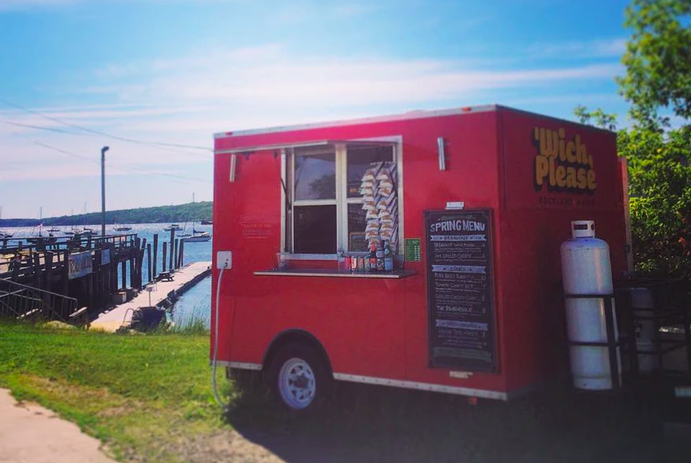
A photo of my first food trailer near the water.
Evaluate the quality of the construction of the trailer itself. Just like during the tail-end of the California Gold Rush, when entrepreneurs were making more money selling supplies to miners than on finding actual gold, plenty of less-than-scrupulous builders have figured out that they can turn a quick dime by slapping some panels on a trailer, throwing in some shoddy electrical and plumbing, and calling it a “food truck.” If your trailer’s walls are made of aluminum, check all of the seams where the panels fit together, to make sure they are sealed and still watertight. Check to make sure that all tables and equipment is bolted to the floor or walls, and check how those connections are made.*
*I found a table in my food truck that was held in place with what seemed like 2,000 self-tapping sheet metal screws, twisted into a 2mm thick piece of aluminum, which offered no real support or structure and made moving equipment around extremely difficult, to say the least.
If you live in a cold climate, you’ll want a trailer that’s insulated, so that you can stay open year round. The heat of your appliances may be enough to stay warm in the winter, but consider your need for additional heating or cooling. For maintenance, look for interiors that are made of solid aluminum or stainless steel, to make cleanup simpler and to keep the health inspector happy.
Check for rust, particularly on the underside of the concession trailer. While aluminum won’t rust, the steel frame that your trailer is probably built on top of almost certainly will. Check for rust on the frame, on the axel(s), on the towing tongue and jack, and on any external generator cages or fuel tanks. Remember, any rust that exists the day you buy the trailer is only going to get worse with time, and will need to either be addressed or will ultimately lead to equipment failure.
Check laws in your area, and only buy what you need. Before you buy any piece of equipment, check with the laws in your planned area of operation, to find out what their requirements are. If the scenic park you plan to station your concession trailer in only allows food trailers of a certain size or has an appearance ordinance that dictates how large your menu board can be, this is information you’ll want to have before you make a purchase.
Check with your local Fire Marshall, to find out if there are rules for the distance that high-heat equipment must be from walls or other equipment, and whether a fire suppression system is needed for fryers, ovens, or cooktops. If your municipality doesn’t require one, buying a truck with an existing ANSUL system is a waste of money (or could be an opportunity to strip and sell the fire suppression, to finance your first round of ingredient inventory). Don’t buy more than you need, and price yourself out of business before you’ve even started. And don’t worry about that fire suppression system; you’re PROBABLY not going to die in a fire in a cheeseburger-scented aluminum coffin.
Evaluate systems for water, power, propane, and exhaust. There are four things that every concession trailer needs, and if any of them fail at any point during service, you’re going to be unexpectedly done serving for the day.
Electrical System:
How do you connect power to the truck? What type of connection is it? Can the concession trailer run off a generator? How big a generator will you need? What voltage is the truck’s electrical system? What kinds of connections are on all of the appliances? Are there plenty of additional electrical outlets on the truck, and are outlets located near sinks equipped with GFI protection? Is there room on the electrical panel to expand, if your equipment needs change? Are major appliances on a different circuit than lights and outlets? Do all outlets work?
Water System:
Does the concession trailer have options for both a direct water line, as well as on-board freshwater and wastewater? Is there a hot water heater? How big is it? Is it producing water that is at least 110 degrees, as mandated by the health department? Is the water brown or murky, indicating rust in the tank? If you had to replace the hot water heater, is it easy to reach and accessible? If you’re not connected to city water, how does the water move from the freshwater tank to the hot water heater, and then to the sinks? Is there a pump? How is the pump powered? What happens to wastewater? How is the wastewater tank drained? Is there a three-bay sink for washing dishes, with a separate hand wash sink? Are the sinks large enough to make dishwashing practical?
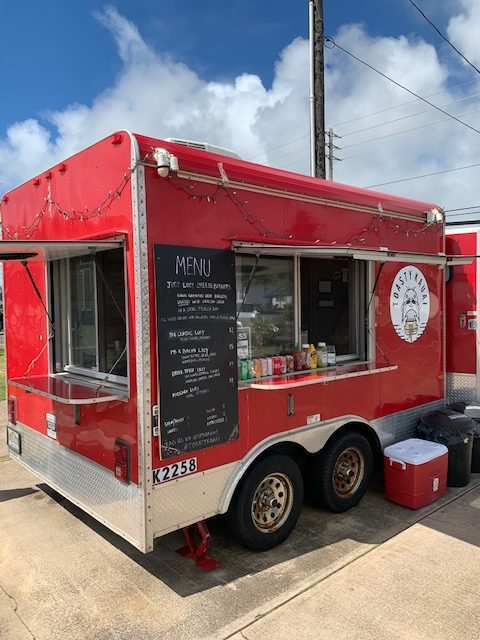
More concession trailers.
Propane System:
Are your major cooking appliances powered by electricity or propane? Where are the propane tanks located? Will you have to have propane delivered, or is there a removable tank? Is the tank large enough to power multiple appliances for several days at a time? Is there a spare? Are all gas connections to appliances tight, with regulators in place as needed? Is there a fire suppression system? Has it ever been fired? When was it last inspected? Does it need to be recharged?
Exhaust System:
Is the exhaust hood making any weird noises? Is it sucking air from the surface of the grill, oven, or fryers?* Have the filters been recently cleaned? Is the hood large enough to support your equipment needs?
*Protip: Hold a sheet of paper up to the filters, and see if it sticks in place, indicating good airflow. Dirty filters can impede suction, as can a faulty or broken belt on the exhaust fan motor. Not only is this dangerous from a “breathing” perspective, but without proper exhaust, temperatures inside your truck can reach upwards of 130 degrees, which is not a super-fun environment in which to work.
Finally, evaluate whether a concession trailer is even what you’re after. Remember, a food trailer needs a tow vehicle, and moving it will be a process that takes careful planning and scheduling. If you’re planing a truly mobile business, a full-fledged food truck may be more the solution you’re looking for. On the other hand, if you’re planning on staying mostly fixed in one location, you might find that making the leap straight into a brick-and-mortar space makes the most sense.
Remember that when you purchase this type of equipment, especially secondhand, you are signing on for all of the problems of both a commercial kitchen AND a used vehicle, whether it’s one you tow, or one you drive. Make decisions based not on what’s the flashiest or most expensive, but on what the actual needs of your business are, and act accordingly. Most of all: Good luck out there!

